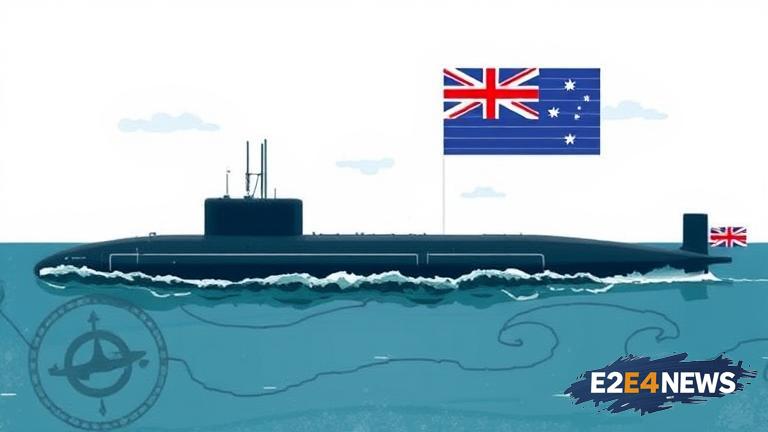The recent demands made by a think tanker for Australia’s involvement in the AUKUS (Australia, UK, and US) pact have ignited a heated discussion on the country’s strategic priorities. The AUKUS pact, announced in 2021, aims to enhance the three nations’ cooperation on defense and security issues, with a focus on the Indo-Pacific region. At the heart of the debate is the acquisition of US submarines by Australia, which has been touted as a key component of the AUKUS agreement. Proponents of the deal argue that it will significantly enhance Australia’s naval capabilities, allowing the country to play a more prominent role in regional security affairs. However, critics have raised concerns about the potential risks and costs associated with the acquisition, including the financial burden and the potential for increased tensions with neighboring countries. The think tanker’s demands have added fuel to the fire, with some arguing that Australia should prioritize its own national interests over its commitments to the AUKUS pact. Others have countered that the acquisition of US submarines is essential for maintaining regional stability and deterring potential aggressors. As the debate rages on, the Australian government is faced with a difficult decision: to proceed with the acquisition of US submarines or to explore alternative options. The outcome will have significant implications for Australia’s national security, its relationships with regional partners, and its position within the AUKUS pact. The AUKUS agreement has been hailed as a landmark deal, marking a new era of cooperation between the three nations. However, the complexities of the pact and the demands made by the think tanker have highlighted the need for careful consideration and nuanced decision-making. The Australian government must weigh the potential benefits of the acquisition against the potential risks and costs, taking into account the country’s strategic priorities and regional dynamics. The Indo-Pacific region is a critical area of focus for Australia, with the country seeking to maintain its influence and promote stability in the face of rising tensions. The acquisition of US submarines could potentially enhance Australia’s capabilities in this regard, allowing the country to play a more prominent role in regional security affairs. However, the deal has also been criticized for its potential to exacerbate existing tensions, particularly with China. The Chinese government has expressed concerns about the AUKUS pact, viewing it as a threat to regional stability and an attempt to contain its growing influence. The Australian government must navigate these complex dynamics, balancing its commitments to the AUKUS pact with its desire to maintain positive relations with regional partners. The think tanker’s demands have added an extra layer of complexity to the debate, with some arguing that Australia should prioritize its own national interests over its commitments to the pact. Others have countered that the acquisition of US submarines is essential for maintaining regional stability and deterring potential aggressors. As the debate continues, the Australian government is faced with a difficult decision that will have significant implications for the country’s national security and its position within the AUKUS pact. The outcome will depend on a careful consideration of the potential benefits and risks associated with the acquisition, as well as the country’s strategic priorities and regional dynamics. The Australian government must also take into account the views of regional partners, including China, and seek to maintain positive relations with these countries. The AUKUS pact has the potential to enhance regional stability and promote cooperation between the three nations, but it also poses significant risks and challenges. The Australian government must navigate these complexities with care, prioritizing the country’s national interests while also maintaining its commitments to the pact. The acquisition of US submarines is a critical component of the AUKUS agreement, and the Australian government must carefully consider the potential benefits and risks associated with the deal. The outcome will have significant implications for Australia’s national security, its relationships with regional partners, and its position within the AUKUS pact. The debate surrounding the AUKUS pact and the acquisition of US submarines is complex and multifaceted, with various stakeholders and interest groups weighing in on the issue. The Australian government must take a nuanced and informed approach to decision-making, prioritizing the country’s national interests while also maintaining its commitments to the pact. The AUKUS pact has the potential to enhance regional stability and promote cooperation between the three nations, but it also poses significant risks and challenges. The Australian government must navigate these complexities with care, seeking to maintain positive relations with regional partners while also prioritizing the country’s national interests. The acquisition of US submarines is a critical component of the AUKUS agreement, and the Australian government must carefully consider the potential benefits and risks associated with the deal. The outcome will have significant implications for Australia’s national security, its relationships with regional partners, and its position within the AUKUS pact. The think tanker’s demands have added an extra layer of complexity to the debate, with some arguing that Australia should prioritize its own national interests over its commitments to the pact. Others have countered that the acquisition of US submarines is essential for maintaining regional stability and deterring potential aggressors. As the debate continues, the Australian government is faced with a difficult decision that will have significant implications for the country’s national security and its position within the AUKUS pact.
